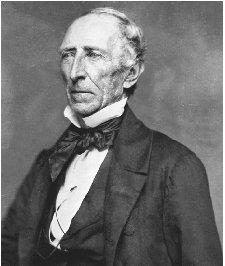William Henry Harrison and John Tyler
Richard P. McCormick

WILLIAM HENRY HARRISON, the first Whig elected to the presidency, was inaugurated on 4 March 1841. A month later he was dead. John Tyler thus became the first vice president to succeed to the office of president of the United States upon the death of the incumbent. Tyler is most commonly remembered in connection with the 1840 campaign slogan "Tippecanoe and Tyler Too." He also acquired dubious fame as the president who was disowned by his political party because he vetoed important measures enacted with the support of that party in Congress. Because of this circumstance, his administration has often been termed a disaster and Tyler has been placed at, or near, the bottom in rankings of American presidents. Whatever may have been his shortcomings as a political leader, his administration was neither uneventful nor inconsequential. It was, on the contrary, unusually important in the evolution of political parties, in shaping the course of domestic policies, and especially in launching new initiatives in foreign affairs.
BIBLIOGRAPHY
The best study, which also supplies a useful bibliography, is Norma Lois Peterson, The Presidencies of William Henry Harrison and John Tyler (Lawrence, Kans., 1989).
Freeman Cleaves, Old Tippecanoe: William Henry Harrison and His Time (New York, 1939; repr. 1990), is the standard biography. Harrison's election is ably treated in Robert G. Gunderson, The Log-Cabin Campaign (Lexington, Ky., 1957).
An admiring biography is Oliver Perry Chitwood, John Tyler: Champion of the Old South (New York, 1939). Robert Seager II, And Tyler Too: A Biography of John and Julia Gardiner Tyler (New York, 1963), is especially valuable for its depiction of Tyler's personal life. Henry A. Wise, Seven Decades of the Union . . . : A Memoir of John Tyler (Philadelphia, 1881), is a worshipful account by a contemporary. The best compendium of Tyler documents is Lyon Gardiner Tyler, The Letters and Times of the Tylers , 3 vols. (Richmond, Va., 1884–1896). Indispensable for Tyler's views on the issues of his administration is James D. Richardson, ed., A Compilation of the Messages and Papers of the Presidents, 1789–1897 , vol. 4 (Washington, D.C., 1897).
William R. Brock, Parties and Political Conscience: American Dilemmas, 1840–1850 (Mill-wood, N.Y., 1979), offers a provocative explanation for the failure of the Whigs under Tyler. Outdated but still useful is Oscar D. Lambert, Presidential Politics in the United States, 1841–1844 (Durham, N.C., 1936). The Democratic opposition is best described in Charles G. Sellers, James K. Polk , Jacksonian, 1795–1843 and James K. Polk, Continentalist, 1843–1846 (Princeton, N.J., 1957, 1966). John Ash-worth, "Agrarians" and "Aristocrats": Party Political Ideology in the United States, 1837–1846 (London, 1983), attempts to define opposing party beliefs. A perceptive study by a political scientist is Robert J. Morgan, A Whig Embattled: The Presidency Under John Tyler (Lincoln, Nebr., 1954).
Merrill D. Peterson, The Great Triumvirate: Webster, Clay, and Calhoun (New York, 1987), is indispensable because of the large roles these giants played during Tyler's administration. Thomas B. Alexander, Sectional Stress and Party Strength: A Study of Roll-Call Voting Patterns in the United States House of Representatives, 1836–1860 (Nashville, Tenn., 1967), provides analyses of alignments in Congress on key issues. New understandings of Webster's role in the Tyler administration are developed in Sydney Nathans, Daniel Webster and Jacksonian Democracy (Baltimore, 1973). George R. Poage, Henry Clay and the Whig Party (Chapel Hill, N.C., 1936), is not uncritical of Clay as an opponent of Tyler. Howard Jones, To the Webster-Ashburton Treaty: A Study in Anglo-American Relations, 1783–1843 (Chapel Hill, N.C., 1977), gives due credit to Tyler for this diplomatic achievement. The best study of a complex problem is David M. Pletcher, The Diplomacy of Annexation: Texas, Oregon, and the Mexican War (Columbia, Mo., 1973). Tyler's expansionist policy is also the subject of Frederick Merk, Fruits of Propaganda in the Tyler Administration (Cambridge, Mass., 1971). The economic problems of the period are examined by George Rogers Taylor, The Transportation Revolution, 1815–1860 (New York, 1951). Tyler's support for exploratory expeditions is described in William H. Goetzmann, New Lands, New Men: America and the Second Great Age of Discovery (New York, 1986). The serious student will want to consult the relevant volumes of the papers of John C. Calhoun, Henry Clay, Andrew Jackson, James K. Polk, and Daniel Webster.
Comment about this article, ask questions, or add new information about this topic: